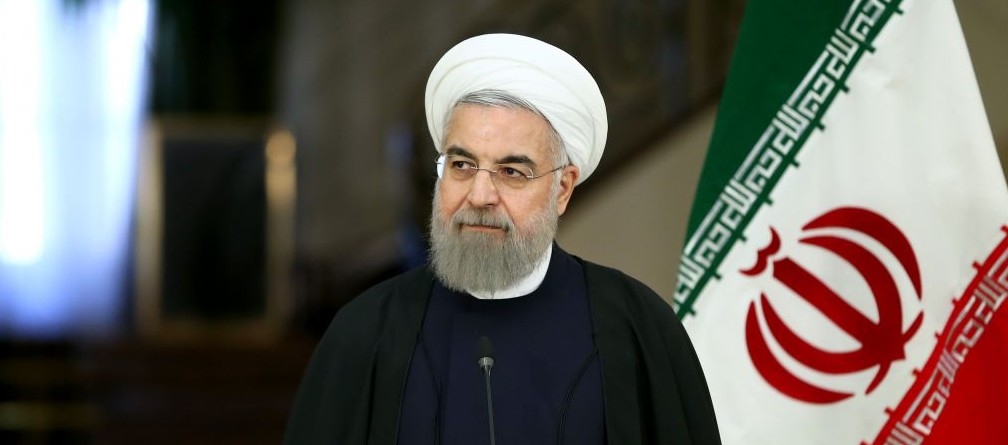Rouhani warns not to scrap JCPOA
April 10, 2018 | Expert Insights

On Monday, Iranian President Rouhani said that the United States would “regret” withdrawing from the Joint Comprehensive Plan of Action (JCPOA) nuclear deal. The deal has been repeatedly criticised by President Trump, who has threatened to withdraw from the deal if certain issues, such as Iran’s ballistic missile program are not addressed. Newly appointed National Security Advisor John Bolton has taken a hawkish stance on Iran.
Background
Iran is the second largest country in the Middle East, with a rich history and culture dating back to the 6th Century BC. However, modern day Iran is considered one of the most oppressive regimes in the world. The government of Iran has been criticized for restrictions and punishments that follow the Islamic Republic’s constitution and law.
Iran’s nuclear program was first launched in the 1950s, with help from the United States. Iran signed the Nuclear Non-Proliferation Treaty in 1970. Support from the West continued until the Iranian Revolution and the ascent of Ayatollah Khomeini into power. Iran’s nuclear program has been a source of concern for the international community since then.
During the International Atomic Energy Agency’s (IAEA) investigations in the country, it was revealed that Iran had not declared a number of its nuclear activities and was not in compliance with the Non-Proliferation Treaty. In 2006, the country also refused to suspend its uranium enrichment program. The United Nations consequently imposed a number of sanctions on the nation.
By 2015, the nation had lost billions of dollars due to these sanctions; an estimated $100 billion in oil revenue alone. It had also lost out on Foreign Direct Investment. In July 2015, Iran agreed to sign a nuclear agreement (the Joint Comprehensive Plan of Action or JCPOA) with major powers Britain, China, France, Germany, Russia, and the United States. According to the JCPOA, Iran would limit its nuclear ambitions in return for relief from a number of sanctions. The IAEA declared that Iran had complied with the terms of the provisional agreement and sanctions were lifted in 2016.
However, there has been growing criticism for the deal. Critics have cited three key defects in the JCPOA. The first is that the JCPOA does not address ballistic missiles. The second has to do with restrictions on the inspection of nuclear sites. The third is the “sunset clause”, which places a time limit of 10 years on the nuclear restrictions, after which they may begin to expire.
Analysis
April 9th was Iran’s “National Nuclear Technology Day”, a celebration of the country’s nuclear technology and capabilities. Iranian President Hassan Rouhani stated that Iran’s nuclear industry is growing rapidly, “with more energy, accuracy and more exact calculation”. He also warned that President Trump would “regret” dropping Iran’s nuclear deal.
US President Donald Trump refused to certify Iran’s compliance with the deal in October last year. Israel, Iran’s primary adversary, has also spoken against the deal. While France and Germany have expressed support for the JCPOA, they have spoken in favour of curbing Iran’s ballistic missile program. France, Germany and the UK have encouraged the EU to take up new sanctions against the country, in order to preserve the JCPOA. Washington hopes for European allies to commit to improving the deal by May 12th.
“The new U.S. president - who has big claims and many ups and downs in his words and actions - has been trying for 15 months to break the JCPOA ... but the structure of the JCPOA is so strong that it has not been shaken by such quakes,” Rouhani said in a televised address. “Iran will not violate the nuclear deal, but if the United States withdraws from the deal, they will surely regret it. Our response will be stronger than what they imagine and they would see that within a week.” On Sunday, nuclear chief Ali Akbar Salehi reportedly told journalists that “preparations have been made” for the scenario that other parties would violate the JCPOA.
Iranian officials have made similar threats in the past. At the Munich Security Conference earlier this year, Israeli Prime Minister Netanyahu reiterated his position to scrap Iran’s nuclear programme. “I think they’ll do nothing,” Netanyahu said, in regards to possible retaliation. At the time, Iranian Foreign Minister Mohammad Zarif responded: “I can assure that if Iran’s interests are not secured, Iran will respond… It would be a response that means people would be sorry for taking the erroneous action they did.”
Iran has repeatedly warned that it would not “remain in a deal that has no benefit.” However, it has also emphasised that its weapons programme is only for self-defence. “We will produce any weapons necessary to defend our country in such a volatile region. But we will not use our weapons against our neighbours,” Rouhani said on Monday. It has also denied that the “sunset clause” is a potential threat.
Analysts have expressed their belief that Iran is unlikely to end its missile program. Maysam Behravesh, writing for Reuters, stated that “Iran is unlikely to agree to any restrictions on its missile program beyond a superficial “cap” on the range of its missiles… From Tehran’s point of view, the missile program is a question of self-preservation, particularly because decades of Western sanctions have prevented Iran from building up a powerful air force.”
Assessment
Our assessment is that Iran remains firm on its stance to maintain its missile program. It is possible that Tehran will react negatively if the deal if scrapped. The hawkish John Bolton, who recently assumed position of National Security Advisor in Washington, has signalled his support for initiating a war against North Korea and Iran in the past. We believe that such a war would be disastrous. We have previously stated our belief that it may be necessary for Washington and its allies to ensure that the JCPOA remains in place.








Comments